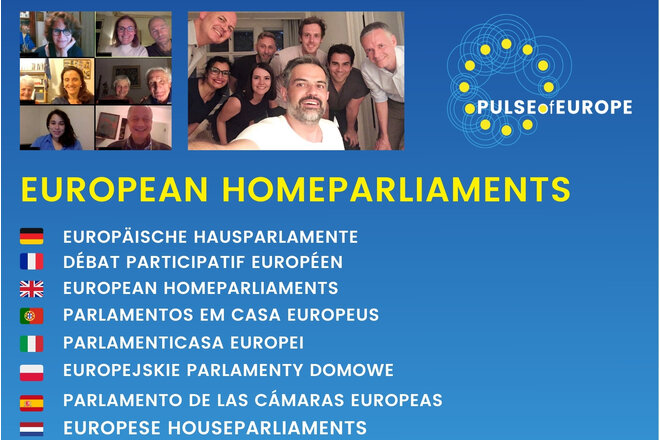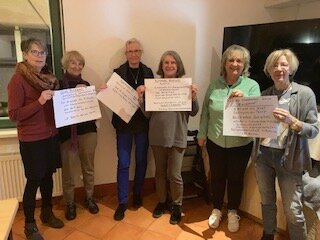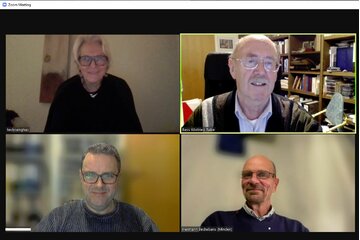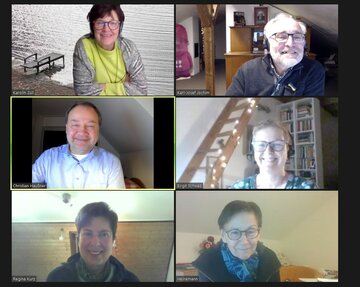Stemvraag
Does Europe's Democracy need a fundamental update?
Abolish the veto in the Council, strengthen the Parliament, involve citizens continuously.
achtergrond
In the arena of European politics, citizens are often standing only on the sidelines. Participating in the European elections every few years is not enough for more and more people. An overwhelming 92% of people in the EU want their voices to be taken more into account (Eurobarometer, 2021). 44% of citizens demand fundamental institutional reforms (Eurobarometer, 2020). In line with the currently ongoing Conference on the Future of Europe (#CoFoE), that brings citizens from across the EU together and offers a space to share ideas and suggestions, this round of European HouseParliaments focuses on European democracy. In this round, we want to discuss and debate three fundamental reforms to strengthen and renew European democracy.
Gedeeltelijke vragen
1. Should the principle of unanimity in the Council of the European Union be abolished and replaced by qualified majority voting?
Achtergrond: At the Council of the European Union (Council of Ministers), the government representatives of the member states meet regularly to discuss and make decisions on important European policy areas (e.g. foreign and security policy, social affairs, finance, environment). This so-called "chamber of states" exercises lawmaking within the European Union together with the European Parliament. For central issues, such as foreign and security policy, financial budget or citizens' rights, the unanimity principle applies and this allows individual states to block or delay decisions. It is proposed to abolish this veto system and replace it with a qualified majority (55% of member states voting in favor of a proposal by member states that together account for at least 65% of the total population of the EU) or a newly designed majority voting procedure.
Pro
Faster decisions and thus increased reaction speed in crises are possible.
Qualified majority promotes European rather than national policies
Makes the EU less susceptible to blackmail by individual member states
Contra
Current unanimity principle requires agreement by all members states and thus promotes unity in the EU
Can deepen divisions among EU member states
The unanimity principle ensures national souveranity
Aanvullingen uit de bijeenkomsten
Expanding the threshold for veto: we need to avoid one state holding others, so it is ok to have *rephrase, not 55% but at least 75%. To abolish it but with a larger threshold. If you want to enlarge the union, then you want to abolish it more consistently.
In the current EU policies environment, most policies are written in crisis time, otherwise, we wouldn’t have all the countries' support which for security reasons and foreign policies is essential, hence we need unanimity.
Some countries like Norway might not wanna join the EU as it might lower citizens might be afraid of losing control over certain topics and get things Imposed on them. The way Norway does not veto in the EEA would not work in the EU cause it is harder to transfer such ‘fear of being left out to something so big and wide.
2. Should a representative citizens' council advise the EU institutions on fundamental decisions?
Achtergrond: Outside of European elections, European citizens do not have many opportunities to contribute their ideas and perspectives. Citizens' Councils can change that. They are a permanent institution of citizen participation. European citizens are randomly selected by lot to join the Citizens' Council, which advises the EU institutions on fundamental European policy issues. Citizens' Council members do not have a mandate like members of parliament. They make recommendations, can be asked for their opinion and are therefore an additional link between the population and the EU institutions.
Pro
Permanent opportunity for citizens to contribute ideas and bring in perspectives
Makes EU institutions more responsive to the needs and ideas of citizens
Brings citizens and politicians together and increases trust in European democracy
Contra
The EU Parliament is the permanent and legitimately elected representation of the citizens. An additional Citizens' Council is not necessary and weakens the Parliament.
Prolongs procedures and decision-making processes in the EU
High demands and pressure on participating citizens
3. Should the European Parliament be able to propose and initiative its own legislation in addition to the EU Commission?
Achtergrond: Currently, the European Commission is the only EU institution with the right to propose legislation. The European Parliament and the Council of the European Union can only request the Commission to take legislative action on a specific issue. In recent years, the Commission has responded more frequently to proposals from the Council, but less so from the Parliament. It is proposed to give the European Parliament, as the representative of the EU citizens and the only fully democratically elected body in the EU, the right of legislative initiative.
Pro
More ideas and proposals for the EU legislative process
The right to propose legislation strengthens the role of the Parliament in the structure of the EU institutions
The right can strengthen the confidence of citizens in the effectiveness of elected representatives
Contra
The EU Parliament can already propose topics to the EU Commission today
Even more duplicate competences. The power of the EU Commission will be weakened and procedures extended
The right to propose legislation by parliaments already exists today on the national level, but is rarely actively used. Governments propose most laws.
Bronnen
- www.europarl.europa.eu/news/en/press-room/20210301IPR98958/eu-wide-survey-shows-europeans-support-the-conference-on-the-future-of-europe
- www.europarl.europa.eu/at-your-service/files/be-heard/eurobarometer/2020/parlemeter-2020/en-report.pdf
- www.consilium.europa.eu/de/documents-publications/library/library-blog/posts/new-council-qualified-majority-voting-rules-in-effect/
- www.consilium.europa.eu/en/council-eu/decision-making/ordinary-legislative-procedure/
- citizensassemblies.org/wp-content/uploads/2018/10/Citizens-Assemblies_EN_web.pdf
- www.bertelsmann-stiftung.de/en/our-projects/democracy-and-participation-in-europe/shortcut-archive/shortcut-2
- www.europarl.europa.eu/RegData/etudes/STUD/2020/655134/IPOL_STU(2020)655134(SUM01)_EN.pdf
- www.europarl.europa.eu/about-parliament/en/powers-and-procedures/legislative-powers
Analyse
Does Europe's Democracy need a fundamental update?
Toestemmingen 73
Afwijzingen 1
Onthoudingen 3
Dit is hoe de geadresseerden zich uiten
Die EU Parlamentarierin Gabriele BISCHOFF (S&D) hat auf die Ergebnisse der Europäischen HausParlamente in einem Videostatement geantwortet. Du kannst es hier anschauen:
https://www.facebook.com/PulseofEurope/videos/392030939540785
Der EU Parlamentarier Helmut SCHOLZ (Left) hat auf die Ergebnisse der Europäischen HausParlamente in einem Videostatement geantwortet. Du kannst es hier anschauen: https://www.facebook.com/PulseofEurope/videos/1604569186607203
naar de resultatenDie Vizepräsidentin des EU Parlaments Katarina BARLEY (S&D) hat auf die Ergebnisse der Europäischen HausParlamente in einem Webinar geantwortet. Du kannst es hier anschauen: https://www.youtube.com/watch?v=9lY-fNX6GuU
naar de resultatenDer EU Parlamentarier Jan-Christoph OETJEN (Renew) hat auf die Ergebnisse der Europäischen HausParlamente in einem Videostatement geantwortet. Du kannst es hier anschauen: https://www.facebook.com/PulseofEurope/videos/762704808420308
naar de resultaten
Der EU Parlamentarier Rasmus ANDERSEN (Greens) hat auf die Ergebnisse der Europäischen HausParlamente in einem Webinar geantwortet. Du kannst es hier anschauen:
https://www.youtube.com/watch?v=NghBx9Eybzg
Die Vizepräsidentin des EU Parlaments Nicola BEER (Renew) hat auf die Ergebnisse der Europäischen HausParlamente in einem Webinar geantwortet. Du kannst es hier anschauen:
https://www.youtube.com/watch?v=Y1QD5fgnxaA
Die deutsche Staatssekretärin Franziska Brantner (Greens) und französische Abgeordnete Gwendoline Delbos-Corfield (Greens) haben auf die Ergebnisse der Europäischen HausParlamente in einem Webinar geantwortet. Du kannst es hier anschauen: https://www.youtube.com/watch?v=nchQapZi8bE
naar de resultaten1. Should the principle of unanimity in the Council of the European Union be abolished and replaced by qualified majority voting?
De stemresultaten bestaan uit 407 ingevoerde resultaten.
Trend (mediaan)
Gemiddeld
2. Should a representative citizens' council advise the EU institutions on fundamental decisions?
De stemresultaten bestaan uit 405 ingevoerde resultaten.
Trend (mediaan)
Gemiddeld
3. Should the European Parliament be able to propose and initiative its own legislation in addition to the EU Commission?
De stemresultaten bestaan uit 405 ingevoerde resultaten.
Trend (mediaan)
Gemiddeld




















